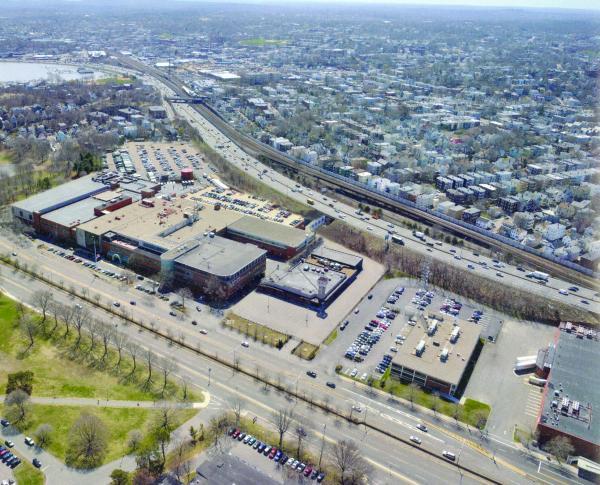June 24, 2021

The southeast expressway slices through Dorchester near Savin Hill and Columbia Point in this aerial image from 2017.
The Southeast Expressway —built in the 1950s— has long been a nuisance and an obstacle for those of us who live and work here. It cuts us off of from our waterfront. It’s an eyesore and a source of constant noise and congestion that spills over onto our roadways. Now, new research suggests, the long-term impacts of the highway and the traffic that constantly churns through our neighborhood is far more sinister in nature.
On Tuesday, a discussion of just how serious the health consequences might be — and what we can do about them— was aired out during a hearing of the Legislature’s Public Health Committee. Lawmakers are examining proposed legislation that would seek to ramp up efforts to monitor air quality in “pollution hotspots” across the Commonwealth. Dorchester would definitely be one of them.
Rep. Christine Barber, who represents Somerville, filed the legislation with Rep. Mike Connolly of Cambridge and Sen. Pat Jehlen of Somerville.
“Science shows us that exposure to any amount of particulate matter increases the risk of developing numerous diseases. This is of particular concern for my district, as Somerville contains multiple environmental justice communities living near I-93 and McGrath Highway/Mystic Avenue,” Barber said, according to the State House News Service.
In her testimony, Barber pointed to a newly released report from the Metropolitan Area Planning Council — titled “Particulate Policy”— that links particulate matter spewed out along I-93 and other big corridors to higher rates of cardiovascular and respiratory diseases, such as lung cancer and asthma.
“Ultrafine particles are invisible and odorless,” said Doug Brugge, the chair of the Department of Public Health Sciences at the University of Connecticut School of Medicine and the co-author of the MAPC report. “Even people exposed to very high concentrations are usually not aware of them. Our research in and near Boston has shown that ultrafines are associated with inflammation in the blood, an indicator of risk of heart attacks and strokes. We also showed that reducing exposure resulted in lower blood pressure.”
What can be done to mitigate the effects of the pollution? The bill now under consideration would require the governor to convene a “technical advisory committee” that would include residents who live near major roadways, along with experts in air monitoring and labor representatives. It would also mandate air filter installation and “advanced HVAC filtration systems for new eligible buildings, upgraded building codes, and expanded air monitoring for ultrafine particulate matter and other pollutants,” according to MAPC.
The State House News Service reports that the bill would also “prohibit the new installation of gas stoves in residential buildings, require advanced HVAC filtration systems for newly built daycare centers, hospitals, nursing homes, schools and more, and require that air filters be installed in existing schools, residential buildings with more than two tenant-occupied units, certain commercial buildings, and correctional facilities within 200 meters of congested roadways.”
The goal, according to the bill’s sponsors: Reduce present-day particulate release by 50 percent by 2030 and 75 percent by 2035. It’s an ambitious goal, but it’s long past time to protect residents in this community and others like it who are put in harm’s way every day.
– Bill Forry



